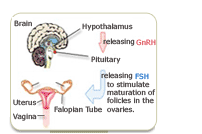34 MENOPAUSE SYMPTOMS |
HEALTH CENTER |
|
| |
|
|
|
|
Menopause Sleep Disorders: Causes |
|
|
|
|
Because education is the key to prevention, it's important to understand why sleep disorders occur during menopause in order to take steps to prevent them. Keep reading to learn about the causes and risk factors for menopause related sleep disorders.
|
|
|
|
:
Sleep disorders in menopausal women are often related to declining estrogen levels. Estrogen hormones have a surprisingly far-reaching effect in the body, and the hormone is essential for a full night's rest for the following reasons:
• Low levels of estrogen can trigger hot flashes and night sweats, one of the main sleep-related complaints of menopausal women. Low levels of estrogen also seem to be related to sleep apnea in women, for reasons that are as yet unclear.
• Low estrogen levels may also be related to insomnia due to insufficient absorption of magnesium. Magnesium helps to relax muscles, and magnesium-deficiency due to can result in disrupted, agitated sleep. Because estrogen plays an important role in magnesium absorption, without adequate levels of the hormone, the body has a harder time absorbing magnesium. |
|
Women are two times more likely than men to suffer from sleep disorders.
Source: www.sleepmed.md
|
|
:
During menopause women will also be at a greater risk to suffer from sleep disorders due to other stimuli. Common risk factors for sleep disorders include the following: |
|
- Being overweight
- Overconsumption of caffeine, alcohol
- Poor sleep habits (going to bed and waking up at different times every day)
- Work-related or marital stress, anxiety
- Depression
- Eating late in the evening
- Smoking
|
|
To overcome sleep disorders, sufferers should make lifestyle changes to decrease stress and improve sleeping habits. Maintaining balanced hormone is also essential for preventing and alleviating sleep disorders. Keep reading to find out about different options for treating menopause related sleep disorders.  |
|
| |
|

|
|
Sleep apnea leading cause of sleep problems |
|
Sleep apnea is a leading cause of disrupted sleep in women. Although it has been considered a typically male disorder, researchers found that sleep apnea frequently appears in menopausal women due to hormonal causes. |
|
|
| |
| |
| |
|
|
|
Sleep disorders may seem unrelenting, but there are different treatment options that can relieve the problem. Keep reading the section below to learn about the most effective treatments for menopause related sleep disorders, including lifestyle changes, alternative treatments, and medical procedures.
|
|
|
|
|
Treatment for Sleep Disorders
with MacaActive Supplements |
|
As you have already read, sleep disorders are mainly caused by declining estrogen levels, which is a natural part of aging. Therefore, if you want relief from this undesirable symptom, you must restore estrogen hormone levels.
Today there are three effective ways to normalize hormonal levels: lifestyle changes, alternative medicine and drugs & surgery.
|
|
 |
Lifestyle Changes: This level of treatment involves no risk, but may be the hardest way to go because you'll have to restrict yourself from many things. That's why most people consider the next level of treatment, alternative medicine, which has proven to be excellent for treating sleep disorders in a safe and natural way.
|
|
 |
Alternative medicine: There are two types of herbal supplements for treating sleep disorders: Those containing phytoestrogenic herbs, and those containing non-estrogenic herbs. Phytoestrogenic herbs (like Black Cohosh) are filled with phytoestrogens, which are similar to estrogens. They can increase low estrogen levels by replacing some of the missing estrogen hormones. This isn't the best solution, however, because your body will become less responsive to producing estrogen on its own, causing a further decrease in body-own hormone levels. Unlike phytoestrogenic herbs, non-estrogenic herbs don't contain estrogen, but nourish hormonal glands to work more efficiently. This ultimately results in balancing not only estrogen, but other necessary hormones, as well. Non-estrogenic herbs are thus one of the best and safest ways to treat sleep disorders naturally.
An excellent example of a safe and effective non-estrogenic herb for hormonal imbalance is herbal MacaActive. What makes MacaActive so special is its ability to balance hormonal levels in women by nourishing the hormonal glands. It thus alleviates most disorders related to hormonal imbalance, including sleep disorders.  to read more about MacaActive.
|
|
 |
Drugs and Surgery: This level of treatment has the highest risk and often the highest costs. The most common drug therapy for treating sleep disorders in the US is hormone replacement therapy (HRT). There's no doubt that this is the quickest and strongest way to combat hormonal imbalance. Unfortunately, it entails serious side effects and increases the risk of different types of cancer in women. If you still want to consider this approach, see your doctor to become better informed about what this treatment option involves.
|
|
A safe way to balance hormones:
Non-estrogenic herbs are the most effective solution for treating hormonal imbalance and its related symptom, sleep disorders.
MacaActive is an excellent non-estrogenic herb. It's simple: rather than putting hormones from the outside into your body artificially, MacaActive stimulates your hormone glands into producing the necessary hormones naturally. This is what makes MacaActive supplements so unique.  to read all about MacaActive. |
 |
|
|
|
|
|
|







